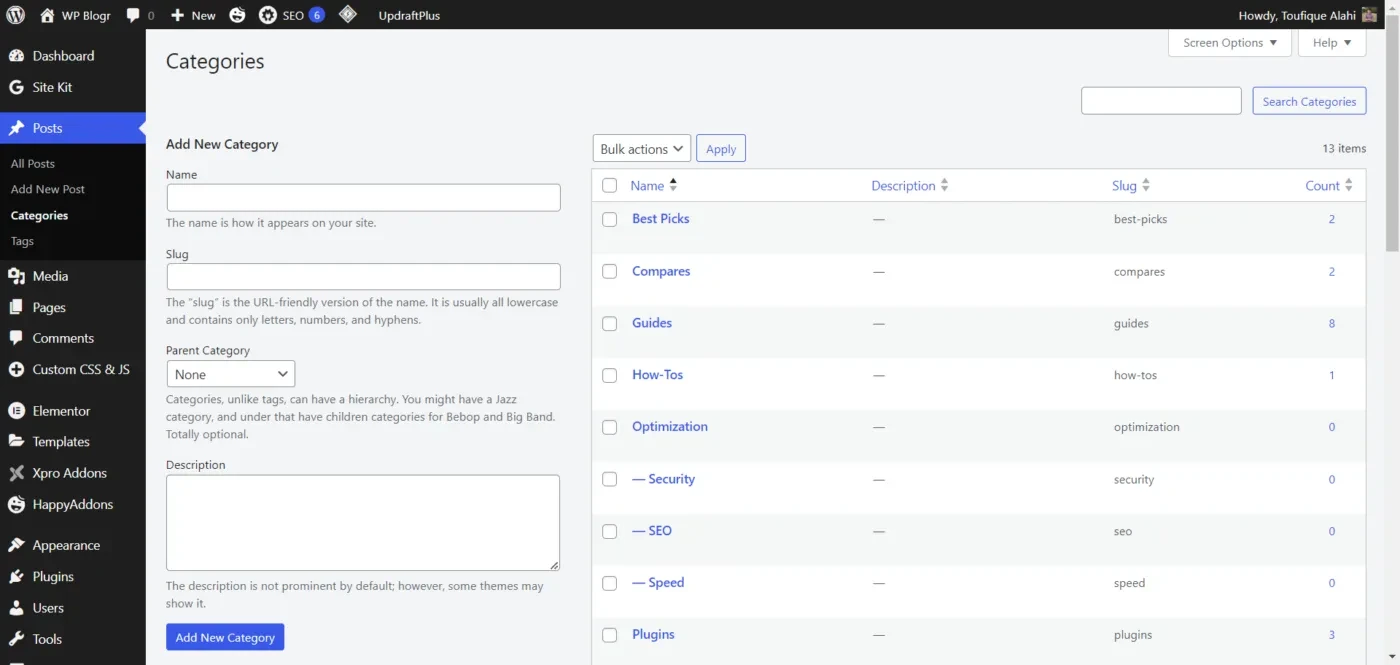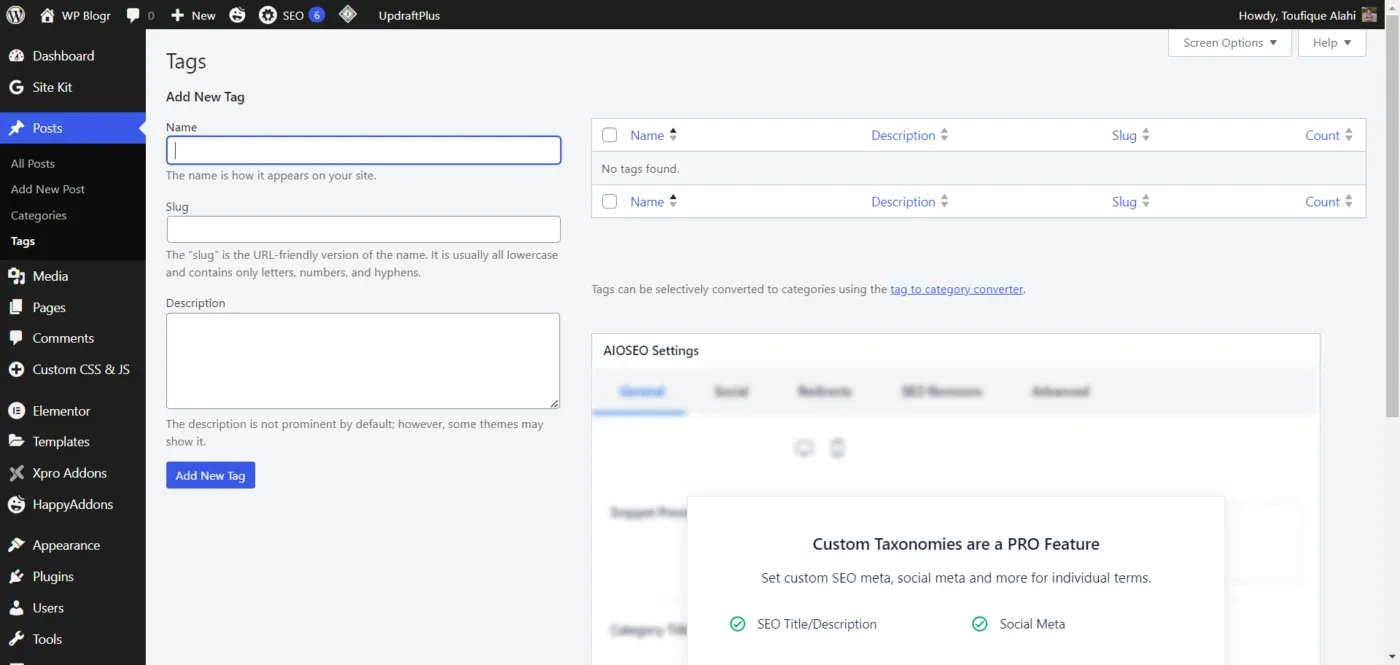When I first started working with WordPress, I found it confusing to organize my content.
Categories or Tags? What’s the difference, and why should I care? If you’ve ever felt the same way, this guide is for you.
Let’s break down which one to use, when to use it, and how to keep your site organized.
What Are Categories?
Categories are like the big, broad topics of your website. Think of them as chapters in a book. If your site is about food, you might have categories like “Recipes,” “Reviews,” and “Healthy Eating.”
Categories organize your posts by topic. This makes it easier for readers to find and explore your content. When you’re setting up categories, keep in mind that they’re hierarchical. That means you can have parent categories and subcategories.
For example, under ‘Recipes,’ you might add subcategories such as ‘Desserts,’ ‘Vegan,’ or ‘Quick Meals. This adds structure and helps users find what they’re interested in without sifting through unrelated content.

What Are Tags?
Tags, on the other hand, are much more specific. While categories cover the broader topic, tags zoom in on the details. Tags are like the keywords or labels that describe the content of your post more precisely.
For example, if you’ve written a post in the “Recipes” category about a chocolate cake, you might tag it with words like “chocolate,” “baking,” “easy recipes,” or “desserts.”
Unlike categories, tags are not hierarchical. They don’t organize your posts in a structured way but give readers and search engines a little more detail about what each post is about.
It’s like the index of a book where you look up specific terms to find related information quickly.

Key Differences Between Categories and Tags
The easiest way to understand the difference is to think of categories as folders and tags as labels on content. Categories are broad, they’re about structure, and they help define the main sections of your site. Tags, on the other hand, are much more granular and flexible.
Categories group posts together, while tags help users find posts with specific details. For example, in a travel blog, you might have a category for “Europe,” but tags could be more detailed, like “Italy,” “backpacking,” or “budget travel.”
Categories create the overall architecture of your site. Tags make it easier for users to pinpoint specific topics within that architecture.
Should You Use Categories and Tags Together or Separate?
Categories and Tags are designed to complement each other rather than be used separately. Categories are used to define the broad sections of your site. They help organize your content into major topics or themes.
For example, in a tech blog, you might have categories like “Gadgets,” “Reviews,” and “How-to Guides.” These broad groupings help structure your site and make it easier for users to navigate through general topics.
Tags, on the other hand, are more detailed and flexible. They help describe the specifics of each post. For instance, if you’re writing a review of a new smartphone, your category might be “Gadgets.”
But your tags could be “smartphone,” “Android,” and “5G.” Tags allow users to find posts with specific attributes or topics. This enhances searchability and content discovery.
By using both categories and tags, you provide a comprehensive system for organizing your content. Categories offer a high-level overview, while tags add detailed, specific information.
This combination makes it easier for readers to dive into the exact details they’re interested in. So, yes—using categories and tags together is effective. It is also recommended for a well-organized and user-friendly site.
SEO Impact: Categories vs. Tags
Here’s where it gets interesting. Categories and tags can impact your SEO if used correctly. Categories help organize your content. This improves user experience and makes your site easier for search engines to crawl. A well-organized site helps Google understand what each section of your site is about, which can boost your ranking.
Tags, while helpful for user navigation, are often misunderstood in SEO. Many people think more tags equal better SEO, but that’s not the case. Over-tagging can dilute the value of your keywords. It’s better to use a few well-chosen tags that accurately describe the content rather than spamming a post with irrelevant ones.
The bottom line: Categories are more important for site structure and SEO, while tags provide additional context. Use both strategically to help users and search engines navigate your content.
Common Mistakes to Avoid
Now, with categories and tags, there are a few pitfalls to watch out for. One common mistake is creating too many categories. Your site can become cluttered and confusing if you have a category for every little topic. Stick to a few broad categories and rely on tags to get more specific.
On the flip side, don’t go crazy with tags. You don’t need to tag every single word or concept in your post. Too many tags can confuse both your readers and search engines. Keep it simple—just a handful of relevant, descriptive tags will do.
Another mistake is misusing categories and tags interchangeably. Categories are for structure, and tags are for details. Don’t mix them up.
Summary
Categories help set up broad sections of your site, making it easier to navigate through major topics. Tags provide specific details about each post, making it simpler for users to find exact content.
Using both categories and tags, you create a well-organized and user-friendly site. So, remember to use categories for general topics and tags for specific details. This will improve the site structure and how readers find information.

